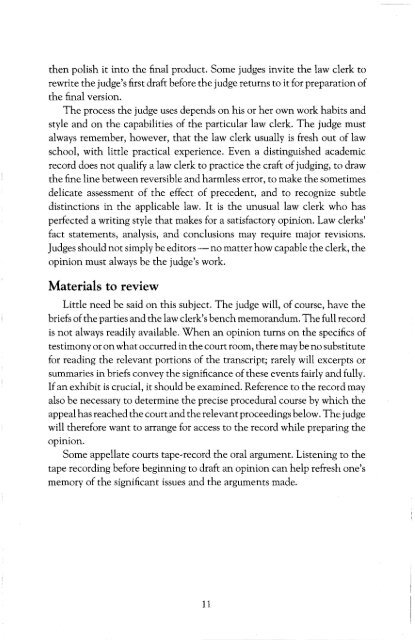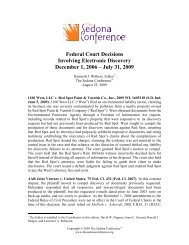Judicial Writing Manual - Federal Judicial Center
Judicial Writing Manual - Federal Judicial Center
Judicial Writing Manual - Federal Judicial Center
Create successful ePaper yourself
Turn your PDF publications into a flip-book with our unique Google optimized e-Paper software.
then polish it into the final product. Some judges invite the law clerk to<br />
rewrite the judge's first draft before the judge returns to it for preparation of<br />
the final version.<br />
The process the judge uses depends on his or her own work habits and<br />
style and on the capabilities of the particular law clerk. The judge must<br />
always remember, however, that the law clerk usually is fresh out of law<br />
school, with little practical experience. Even a distinguished academic<br />
record does not qualify a law clerk to practice the craft of judging, to draw<br />
the fine line between reversible and harmless error, to make the sometimes<br />
delicate assessment of the effect of precedent, and to recognize subtle<br />
distinctions in the applicable law. It is the unusual law clerk who has<br />
perfected a writing style that makes for a satisfactory opinion. Law clerks'<br />
fact statements, analysis, and conclusions may require major revisions.<br />
Judges should not simply be editors - no matter how capable the clerk, the<br />
opinion must always be the judge's work.<br />
Materials to review<br />
Little need be said on this subject. The judge will, of course, have the<br />
briefs of the parties and the law clerk's bench memorandum. The full record<br />
is not always readily available. When an opinion turns on the specifics of<br />
testimony or on what occurred in the court room, there may be no substitute<br />
for reading the relevant portions of the transcript; rarely will excerpts or<br />
summaries in briefs convey the significance of these events fairly and fully.<br />
If an exhibit is crucial, it should be examined. Reference to the record may<br />
also be necessary to determine the precise procedural course by which the<br />
appeal has reached the court and the relevant proceedings below. The judge<br />
will therefore want to arrange for access to the record while preparing the<br />
opinion.<br />
Some appellate courts tape-record the oral argument. Listening to the<br />
tape recording before beginning to draft an opinion can help refresh one's<br />
memory of the significant issues and the arguments made.<br />
11

















